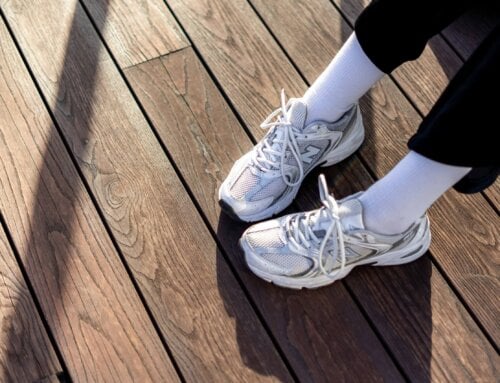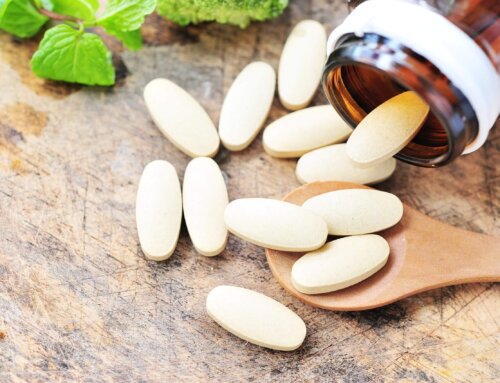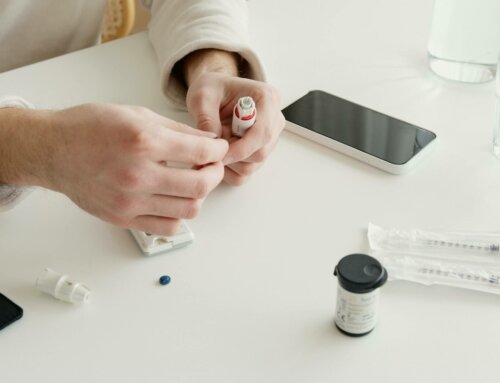The heat is on and this may mean skin problems for people with diabetes. Proper skin care is important all year round, but especially during the summer season. From sunburn and insect bites to dry skin and poison ivy, there are several precautions that should be taken to have the best possible summer skin with diabetes.
Medications Matter
People with chronic diseases such as diabetes, heart disease and blood pressure issues are often on multiple medications for disease management. Certain medications may matter when it comes to your skin.
Talk to Your Doctor
If you are taking pills, creams or salves for any medical condition, consult with your doctor or pharmacist before going into the sun. Certain medications, including diuretics, antibiotics and heart medications can make you more susceptible to sun-related issues. This includes over sensitivity and sunburn in the sun. Diabetes pills including Glyburide, Glipizide, and Glimeperide (sulfonylureas) are specific medications that may cause photosensitivity. You may need to be especially guarded from the sun when taking these medicines.
Staying Hydrated in the Heat
 During the hottest days, people perspire and lose water. The loss of body fluids can lead to dehydration. It is important to stay hydrated in the summer for the best possible diabetes skin care and to avoid other health issues.
During the hottest days, people perspire and lose water. The loss of body fluids can lead to dehydration. It is important to stay hydrated in the summer for the best possible diabetes skin care and to avoid other health issues.
Blood Glucose Control, Dehydration, and Skin
Poor blood glucose control may also lead to dehydration. If your blood glucose levels are high your body may lose more urine. Monitor your blood sugar especially during the heat to maintain the best possible control. Drink plenty of fluids, such as water and sugar-free tea or lemonade. Any zero calorie beverages will do the trick. Limit or eliminate your intake of beverages with alcohol and/or caffeine that may lead to dehydration. Be aware of the signs of heat exhaustion which they include sweating, dizziness, faintness, muscle cramps, clammy or cold skin, rapid heartbeat, headaches, and nausea. If you have these symptoms, get to a cooler place with air conditioning or go into the shade. Drink lots of water and seek medical attention if you feel faint or have palpitations. Consider drinking fluids such as reduced sugar sports drinks if you often suffer from dehydration. Monitor your blood sugar as needed. High glucose levels may also lead to dry skin that is unable to combat bacteria, boosting your risk of skin infection.
Stay Clean and Dry in the Heat
Heavy perspiration due to high humidity levels or active outdoor activities may cause people to get wetter and dirtier during the hottest days of summer. Staying clean and dry, yet moisturized, can minimize skin irritation especially when using proper diabetes skin care.
Keep it Cool
Avoid taking hot showers and baths. A cool or tepid shower lowers your body temperature and gets your skin clean without drying it out. Use a fragrance-free, white, gentle soap to wash your skin and a mild, unscented shampoo for your hair. If you use a cloth it should be non-irritating and never rub your skin. Try to dry off without rubbing using a soft towel. Gently pat your skin until it is completely dry, including the folds of your skin and between your toes. Apply an unscented lotion to moisturize your skin. Avoid putting lotion between your toes. The added moisture may cause fungus especially in the heat of summer. It is important to keep your skin properly moisturized to avoid infections. Cotton underwear is a comfortable, breathable choice that allows air to circulate. Make sure to carefully dry the skin fold crevices where it may easily remain moist and cause a yeast-like fungus to thrive. Referred to as Candida Albicans, this fungus (very common with diabetes) is responsible for many fungal infections that can cause itchy, red rashes with blisters. They may include jock itch, athlete’s foot and ringworm. These infections should be treated by your doctor. Wear breathable diabetes socks with no irritating seams. Wear flip flops if you use a community shower at the gym, or water shoes to the beach or pool to avoid athlete’s foot and to promote good diabetes skin care.
Avoiding and Treating Cuts and Scrapes
From hikes in the woods to walks on the beach, it is important to avoid injuries including cuts and scrapes especially on your feet. Always wear closed, sturdy shoes that fit properly to avoid blisters. Check the inside of your shoes for pebbles before you put them on. For protection of the feet never go barefoot indoors or outdoors. Put on closed slippers at home. Avoid open shoes and flip-flops that can leave your feet susceptible to injuries. Try to stay away from hanging branches and other outdoor brush that can cause scratches. Learn how to treat cuts and scrapes to avoid infection. Check with your health care provider if you see red streaking, a bad odor or discharge from your wound.
What to Do For Cuts and Scrapes
Cuts, abrasions, and scrapes should be treated immediately. Wash minor ones with mild soap and water. If your medical team indicates it is acceptable, use an ointment or antibiotic cream. Minor cuts should be covered with sterile gauze. If you have a burn, major cut, or infection, visit the doctor right away. Check your feet each day. Look for sores, cuts, blisters, calluses and abrasions. Often these are not noticed by people with neuropathy, which is why visual inspections are so important for good diabetes skin care. Use a hand mirror if you have difficulty seeing every angle of your feet. Clip your toenails straight across. Gently use a pumice stone to smooth out rough areas and never cut or scrape calluses. Consult with a podiatrist and/or dermatologist about persistent skin and/or foot problems.
Camping and Hiking Can Lead to Poison Ivy Exposure
Popular summer activities, such as hiking, biking in wooded areas and camping can lead to poison ivy exposure. It is important to be able to identify poison ivy and try to avoid it. Poison ivy can lead to an itchy rash and makes you more prone to skin infections. Once the itching starts it is difficult to break the itch/scratch cycle which can easily rip open skin.
Dealing With Poison Ivy Exposure
If you do end up getting poison ivy exposure thoroughly clean your body with mild soap. Wipe your skin down with 70 percent isopropyl alcohol. Wash all clothing and bedding that has come into contact with your body. Pharmacists often recommend calamine lotion, Benadryl and hydrocortisone cream for the affected areas. Visit the doctor if you do not see any improvement in 2 days. If oral prednisone is prescribed, it can cause a temporary increase in your blood sugar levels so monitor them carefully. The skin lesions and inflammation caused by poison ivy may last longer for people with diabetes who have weaker immune systems.
A Day at the Beach, Park or Pool for Summer Skin Care
Nothing is more enjoyable than spending a day at the beach, park or pool during the summer. The good times can end abruptly if you get sunburn or insect bites. Being well-prepared can help to prevent these skin care calamities.
Gear to Prevent (or Care for) Sunburn and Insect Bites
It takes about the equivalent of a full shot glass of sunscreen to cover the entire body of an adult. Sunscreen should be SPF 30 or higher. Apply it to your skin 20-30 minutes before going into the sun including the tops of your feet, your ears, and your neck (if you are bald, put it on the top of your head). Wear sunglasses and a broad-brimmed hat to protect your eyes and face. A large outdoor umbrella can minimize your exposure to the sun and give you a shady place to remain cool. Reapply sunscreen every two hours and right after you go swimming. Check the expiration date on the sunscreen to make sure it is still effective. Sunscreen should be replaced yearly once it has been opened. Wear a breathable cover-up or loose pants and a t-shirt with SPF built in to avoid sunburn. Long pants and sleeves may prevent insect bites as well. Talk to your doctor about using an insect repellent spray to avoid getting bug bites. Light a citronella candle and plant lemongrass around your outdoor deck to deter bugs. If you get sunburn, a cool shower with unscented, mild soap can help. Look for blisters and seek instant medical help if you find any. Stay out of the sun until your skin heals. Apply a cooling agent such as aloe gel. Avoid using petroleum jelly or lidocaine which may clog pores. Ask your doctor about taking ibuprofen or acetaminophen to reduce the swelling. If insect bites are swollen, itchy and persistent, consult with a physician right away.
Smart summer skin care with diabetes makes it possible to have more fun in the sun. Taking care of your skin and feet can help you stay active throughout the hottest months of the year. Maintaining proper blood glucose levels can also help you have healthier skin for a happier summer.
Enjoyed this article? See our Winter Skin Care Article













Leave A Comment